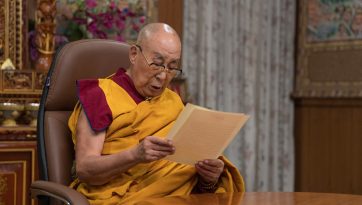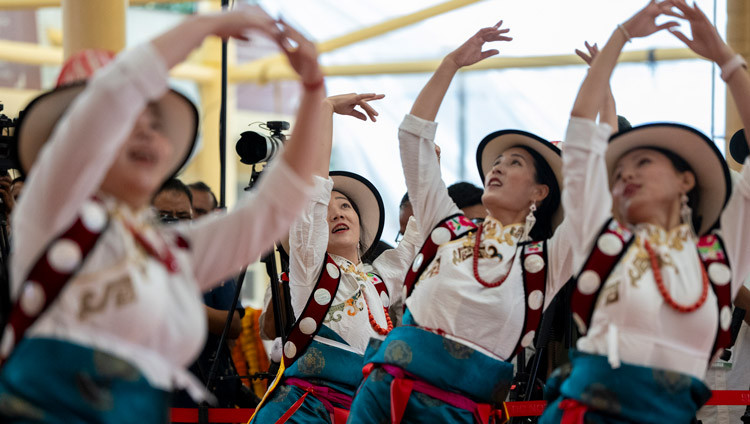Second Day of Nagarjuna’s ‘Precious Garland’ Webcast
May 17, 2020
Thekchen Chöling, Dharamsala, HP, India – “Today is a new day,” announced His Holiness the Dalai Lama as he opened the second session of his webcast teaching about Nagarjuna’s ‘Precious Garland’, “and I’d like to wish all my dharma friends ‘Good morning’.”
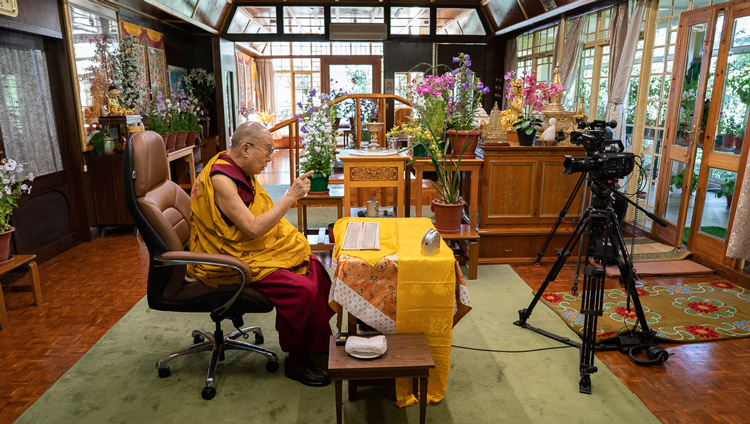
Once again viewers could see His Holiness seated in his residence and while he spoke in Tibetan, his words were simultaneously translated into thirteen other languages: Chinese, French, German, Hindi, Italian, Japanese, Korean, Mongolian, Portuguese, Russian, Spanish, Vietnamese and English. Considering that some of the interpreters were in far off corners of the world, this was a technical feat.
“As I mentioned yesterday,” His Holiness continued, “we all want to be happy and not to suffer, this is true of animals too. However, when we human beings act on the basis of anger and attachment, we bring trouble on ourselves. This often disturbs other creatures as well. We talk endlessly about peace, but bringing it about depends on how human beings behave. In the previous century we saw intensely violent conflict typified by two world wars provoked by narrow-minded thinking in terms of self-interest. In the past, kings sent people into battle with their neighbours in disputes over territory. This is why I think there is an underlying feudal character to warfare.
“However, there has been progress. After the Second World War the United Nations was set up to ensure the welfare of all nations in the world. Europe, saw the establishment of the Council of Europe that grew into the European Union. In a region historically riven by war, peace has prevailed. India historically consisted of kingdoms and princely states, but since independence the establishment of the Union of India has brought the nation together.
“People face difficulties in many parts of the world, but since all seven billion of us live on this one planet we should be united and stand in solidarity with each other. When this blue planet is viewed from space, there are no national boundaries to be seen. To concern ourselves solely with this nation, our nation, is out of date. When affectionate relations exist between members of a family, each one is confident of being able to call on the others for support. In a similar way, we must constantly remind ourselves of the oneness of humanity.
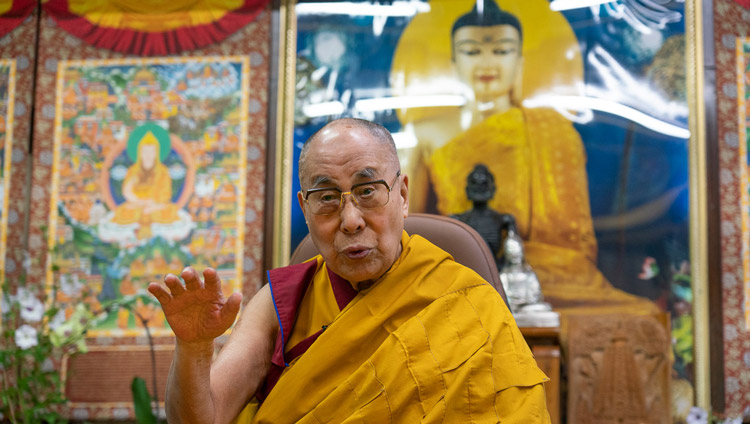
“Religious traditions, Buddhism among them, talk about the happiness of all human beings. Despite differences of philosophical approach, their common message is about the importance of love and compassion. I welcome the variety of religious practice that accords with the variety of human aptitude and interest. A restaurant that served only one dish would not be popular—variety is a human need. I suspect that past conflict between religious traditions had a political character. The traditions and teachings themselves have a potentially positive contribution to make to human flourishing. Just as we human beings should maintain harmony among us, we should seek harmony among our religious traditions too.
“Yesterday, I cited a verse by Aryadeva, which begins, ‘First eliminate what is lacking in merit’. I mentioned the sixteen factors that give rise to favourable birth that Nagarjuna calls ‘high status’. One of the factors refers to not drinking alcohol and I was reminded of an occasion when my Senior Tutor, Yongzin Ling Rinpoché gave the layperson’s precepts here in McLeod Ganj. Afterwards, as he was explaining the vows to the gathering, an elderly man confided that he couldn’t give up drink. Ling Rinpoché smiled and advised, ‘Then at least don’t get drunk.’”
Turning his attention back to Nagarjuna, His Holiness cited the first verse of Chapter 22 of his ‘Fundamental Wisdom of the Middle Way’:
Neither the aggregates, nor different from the aggregates,
The aggregates are not in him, nor is he in the aggregates.
The Tathagata does not possess the aggregates.
What else is the Tathagata?
He mentioned that he often reworks this to refer to himself and reflects on it accordingly:
I’m neither one with the aggregates, nor different from the aggregates,
The aggregates are not in me, nor am I in the aggregates.
I don’t possess the aggregates.
What else am I?
“When you understand that everything, including yourself, is dependently arisen, that nothing exists independently, you’ll understand that there is no independent self, no controller, separate from your body and mind. This is what the third line of Aryadeva’s verse, ‘Later, prevent views of all kinds’ is referring to.
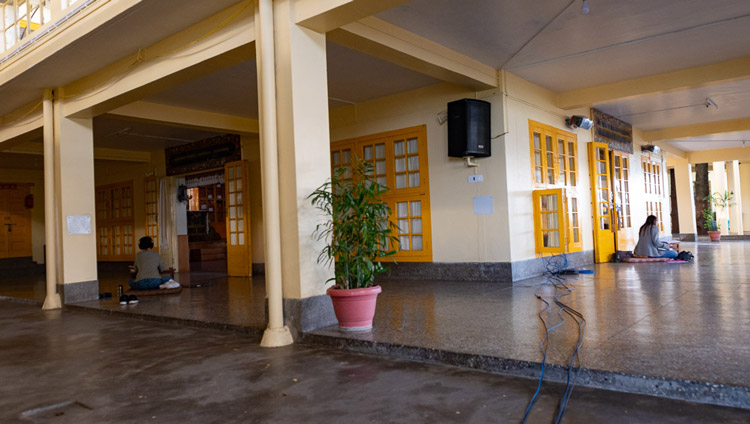
“Where Buddhist literature refers to the lack of an inherently existent self, it does so in order that we may counter our negative emotions.”
Adding to the verses from Shantideva’s ‘Guide to the Bodhisattva’s Way of Life’ that he cited yesterday with reference to being concerned about the happiness of others, he cited another stanza.
Proceeding in this way from happiness to happiness, what thinking person would despair, after mounting the carriage, the Awakening Mind, which carries away all weariness and effort?
And
Having developed the aspiration for highest enlightenment,
I shall invite all sentient beings as my guests,
I shall delightedly enact the supreme enlightened conduct.
May I become a Buddha to benefit all sentient beings.
His Holiness turned to chapter four of the ‘Precious Garland’. Reading verse 465, ‘Therefore in the presence of an image, or monument or something else say these twenty stanzas three times every day’, he remarked that he has several Western friends who recite the following twenty verses daily, as he does himself. The final two verses are:
May I be as dear to sentient beings as their own life,
and may they be even dearer to me.
May their ill deeds bear fruit for me,
and all my virtues bear fruit for them.
As long as any sentient being
Anywhere has not been liberated,
May I remain [in the world] for the sake of that being,
though I have attained highest enlightenment.
His Holiness commented that the Buddhist tradition in Tibet was established by the kind Abbot Shantarakshita with the help of King Trisong Detsen. He encouraged the kind of sceptical curiosity that the Buddha himself recommended:
O monks and scholars,
As gold is tested by burning, cutting and rubbing,
Examine my words thoroughly
And accept them only then—not just out of respect for me.
Careful study on the basis of logic and reason yields the understanding that things come about because of causes and conditions. Because of this, that arises. Cultivating reason and logic enables the development of vast, great, profound and swift intelligence. This accords with the Nalanda Tradition that follows the example set by Nagarjuna. His ‘Fundamental Wisdom of the Middle Way’ is translated into Chinese. If our Chinese brothers and sisters were to study it, His Holiness observed, they would find it very useful—as would our Japanese brothers and sisters too. He added that he also encourages friends who follow the Pali tradition to take an interest in logic.
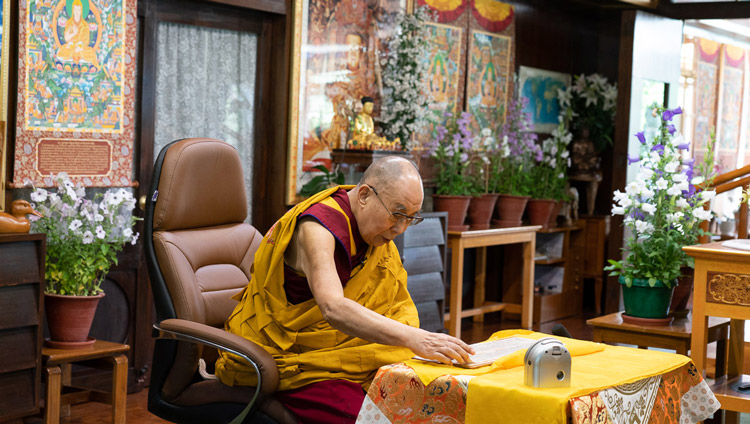
“These days there are many monks and nuns from the Himalayan Region in our monastic institutions. They study books composed by the seventeen masters of Nalanda and so contribute to keeping alive this vast and profound tradition that I consider to be an invaluable part of human culture. It consists of non-harming conduct and the philosophical view of dependent arising in which scientists are taking interest.
“Here we are in the 21st century, we all want to be happy and not to suffer, which means we need the world to be at peace. As I mentioned earlier, we can see that historically wars were fought out of narrow-minded self-interest. This is why it is so important now to think of all human beings as belonging to one family.
“Living in India, a free country, we can take advantage of the opportunity to study and integrate what we learn into our practice. There’s no use just paying lip-service to learning. Trulshik Rinpoché used to tease me saying that Geshés may be learned, but what they know just amounts to empty words with no fruit. Learn through listening and reading, come to an understanding through reflection and turn that into experience through meditation. I’m impressed by Jé Rinpoché’s approach as he describes it in ‘Praise for Dependent Arising’:
“Becoming ordained in the way of the Buddha
not being lax in study of his words,
and by yoga practice of great resolve,
this monk devoted himself to that great purveyor of truth.
“I, too, have tried to integrate the teaching within myself, as a result of which I feel calm and at ease.
“Today, the state of the world is quite critical. Medical professionals are on the front-line treating patients suffering from Covid-19. I sincerely rejoice in the courage of them all and lament that some have sacrificed their lives in the care of others.
“We should not let ourselves become despondent or demoralized because it doesn’t help. When problems like this pandemic come about, if we human beings don’t work together to solve them, who else is going to do it? I request the doctors and researchers seeking a solution to keep up their efforts.”
His Holiness then announced that he would give the transmission of the mantras of the Buddha, the Medicine Buddha, Avalokiteshvara, the embodiment of compassion and patron deity of Tibet, the four-line praise of Jé Tsongkhapa, as well as the mantras of Guru Padmasambhava and Arya Tara.
He advised that it would be usual to first visualize yourself transformed into the deity concerned and if people could do that, it would be well and good. Otherwise, reciting mantras with a wish that the pandemic subside could serve as an impetus to virtuous practice. He said: “You may not think of attaining liberation or the omniscient state of a Buddha, but such recitations may help reduce the kind of idle gossip that comes about in conversation with many different people.
“That’s all. Tashi Delek. I wish to thank you all for paying attention.”
With that, His Holiness folded his hands and the session came to an end.
Source: https://www.dalailama.com/

